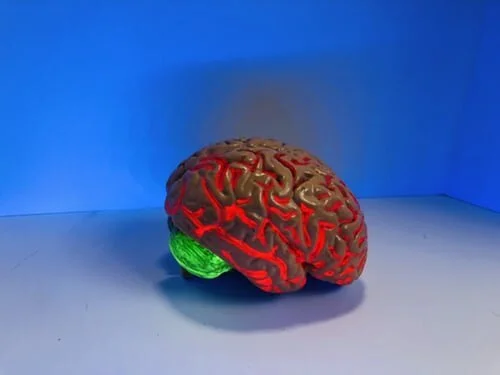Protect Your Brain Now: 10 Factors About How Chronic Anxiety Causes Brain Damage
IS YOUR BRAIN AT RISK?
Chronic anxiety without anxiety treatment destroys brain cells. Anxiety increases the hormone cortisol and affects many brain functions. This puts you at risk for many emotional disorders, relationship problems and other psychological issues.
Anxiety is an unavoidable part of modern life. There are two main kinds of anxiety — acute anxiety and chronic anxiety — and not all anxiety is bad for you. Chronic anxiety leads to anxiety disorders which need treatment. Talk therapy with Cognitive Behavioral Therapy is the best treatment. You should avoid drugs or self-medication with alcohol or other substances.
Acute anxiety is the reaction to an immediate threat, commonly known as the "fight or flight" response. The freeze response is also possible and often ignored in these discussions.
Once the threat is gone, your levels of anxiety hormones return to normal with chronic effects. Some degree of acute anxiety is considered desirable as it prepares your brain for you to do your best. But chronic anxiety — the kind many of us face day in, day out — is a killer. Some studies have shown that 90% of primary care physician visits are for anxiety-related health complaints.
Chronic anxiety makes you more vulnerable to everything from the common cold to cancer. The non-stop elevation of anxiety hormones makes your body sick. It impacts your brain in a bad way as well. When anxiety becomes chronic, it changes the way your brain functions. Even the structure of your DNA.
Cortisol Dangers
Let’s talk a little bit about how chronic anxiety affects your brain with anxiety hormones.
Adrenaline and norepinephrine are anxiety hormones produced when needed in times of extreme excitement. You can thin, move and act quickly in an emergent situation. These hormones can save your life. They quickly leave the body when the threat is over.
But what about Cortisol? It streams through your body all day long. This is what can make it dangerous to our health, especially over time.
Too much cortisol leads to many health problems including weight gain, bone weakness, stomach problems, hormone imbalances, some forms of cancer, cardiac problems, and even diabetes.
Chronic anxiety stresses the adrenal glands. You feel exhausted and activated but tired. Obesity, irritability, poor sleep quality, poor concentration and attention, and short-term memory problems are present when cortisol is higher over time.
What are the Effects of Persistent Anxiety on Your Brain?
PERSISTENT ANXIETY KILLS BAIN CELLS
Anxiety and cortisol take a toll on your body. They also take a high toll on your brain. Many brain-related anxiety symptoms you will recognize. Memory problems, anxiety, and worry. They often become a gradual insidious process that you or those around you will recognize in time. Here are 10 ways chronic anxiety affects the health of your brain and emotional status. Fortunately, there are steps you can take to minimize the damage.
1. Anxiety Causes Free Radicals to Injury Brain Cells.
Cortisol causes too much of the neurotransmitter glutamate. Glutamate creates free radicals. These are unattached oxygen molecules which injure brain cells like oxygen attacks metal making it rust. Free radicals damage brain cell walls, causing them to rupture and die.
Anxiety also contributes to lifestyle behaviors that create more free radicals. For example, losing sleep, eating food that is bad for you, excessive alcohol intake and using nicotine to relax.
2. Chronic Anxiety creates forgetfulness and emotionality.
Memory or concentration problems are often a first sign of persistent anxiety that you or others will notice. “Where re those keys; what did I come into this room for; I thought my appointment was for 1:00 not 10:00. Quite natural your anxiety increases.
There is a physiological reason for this. Research has shown that increased anxiety contributes to electrical signals in the brain weakening fact-based memories and increasing emotional areas of the brain.
3. The Vicious Fear Cycle
ACTIVATION OF ANXIETY AND FEAR
Your brain’s amygdala or fear center is associated with anxiety. Anxiety increases the size, sensitivity level and number of brain connections in this part of your brain. You then become more fearful and a vicious cycle of anxiety is perpetuated.
4. Production of New Brain Cells are Decreased by Anxiety
Each day new brain cells are created as other brain cells die off. A protein process called Brain-derived Neurotrophic Factor (BDNF) keeps our brain cells healthy and is involved in new brain cell formation. It can be thought of as a growth factor for the brain.
BDNF can neutralize the bad effects of anxiety on the brain. Unfortunately, cortisol prevents the production of BDNF. The result is fewer new brain cells. Emotionally, lowered levels of BDNF are associated with depression, obsessive-compulsive disorder, dementia, Alzheimer's disease and even psychotic processes.
5. Anxiety reduces need brain chemicals contributing to depression.
Neurotransmitters are a chemical that is used in communication between brain cells. Persistent anxiety depletes critical neurotransmitters, especially dopamine and serotonin. Low levels of either of these can contribute to depression and addictions.
Serotonin plays a large role in mood states, acquiring new information, appetite control, and sleep. Women who are low in serotonin are especially prone to depressed mood, anxiety, and eating disorders. Men are more prone to alcoholism, attention disorders, and impulsivity.
Dopamine is in charge of your pleasure and reward system. You will be unfocused, less motivated, tired, and depressed if you have low levels of dopamine. People who are low in dopamine often use caffeine, sugar, alcohol, or street drugs to temporarily increase dopamine levels.
Brain-based serotonin depression often includes anxiety and irritability. Dopamine-based depression is accompanied by chronic tiredness and lack of enjoyment of usually enjoyed activities. This is called anhedonia.
6. Anxiety increases risk for behavioral health problems.
Emotional illness or behavioral health problems are complex. The etiology or cause of most emotional problems are not understood. The causes are really a complex variety of factors. Scientific studies have found differences in the brains of people with disorders of anxiety. The brain's gray matter to white matter is lower in individuals with chronic anxiet
If you have anxiety you are more susceptible to panic disorders, PTSD, depression, psychosis, bipolar disorder, alcoholism and chemical dependence.
7. Anxiety dumbs you down.
Too much anxiety causes your brain to fail you during school exams, job interviews, new social engagements and public speaking. Anxiety states are intended to be a survival mechanism.
When you are confronted with life-threatening situations, we have and instinct which will overwhelms problem-solving and reasoning. While this might keep you from being bitten by a snake, it is rarely helpful in day-to-day life. As mentioned before, anxiety decreases memory, affects concentration (except on the perceived danger) and impairs good decision-making. It negatively affects every thought function.
8. Did you know chronic anxiety shrinks your brain?
Research studies have demonstrated that anxiety can measurably shrink your brain. Cortisol can destroy, shrink, and halt the generation of new brain cells in the hippocampus. This is the part of your brain that initially processes new memories.
The hippocampus is key to learning, memory and emotional management, as well as terminating the anxiety response after an anxiety stimulating event is over. Anxiety also contracts the prefrontal cortex. This undesirably affects decision-making, working memory, and regulation of impulsive behavior.
9. Anxiety allows contaminants to enter your brain.
Your brain is highly sensitive to toxins or contaminants of various kind. The blood-brain barrier group of cells that acts as a gate-keeper to your brain. It is a semi-permeable strainer that protects your brain from harmful substances yet lets in needed nutrients.
The blood-brain barrier more permeable when there is persistent anxiety. A leaky brain may let in pathogens, heavy metals, chemicals, and other bad substances. A permeable blood-brain barrier has been connected to brain cancer, brain septicity, and multiple sclerosis.
10. Dementia and Alzheimer's Disease Risk is increased by Anxiety
It is in itself worrying that anxiety increases your risk for life-altering and threatening dementia and Alzheimer's. Being diagnosed with The number one health fear of American adults is being diagnosed with Alzheimer’s Disease.
NOTE: BEWARE OF RETIREMENT STRESS. LEARN MORE HERE
Sadly, Alzheimer's is the sixth leading cause of death. One in three Americans senior citizens will die with Alzheimer's or other types of dementia. It is also the most expensive disease in the US as people need to be cared for sometimes many years with the disease. We cannot to prevent Alzheimer's. as of this writing.
You can modify your behavior to help prevent the disease in many ways. Eating a healthy diet low in sugar and high in brain-healthy fats, exercising regularly, not smoking, staying active mentally, avoiding exposure to toxins, and minimizing anxiety are key. Research has found that anxiety, especially if it occurs in midlife, increases the risk of Alzheimer's Disease.
RETURN TO ANXIETY TREATMENT IN JACKSONVILLE AND BEYOND
OR
RETURN TO FEARLESS MIND HERE
WE HELP ANXIETY
GET A FREE CONSULT




